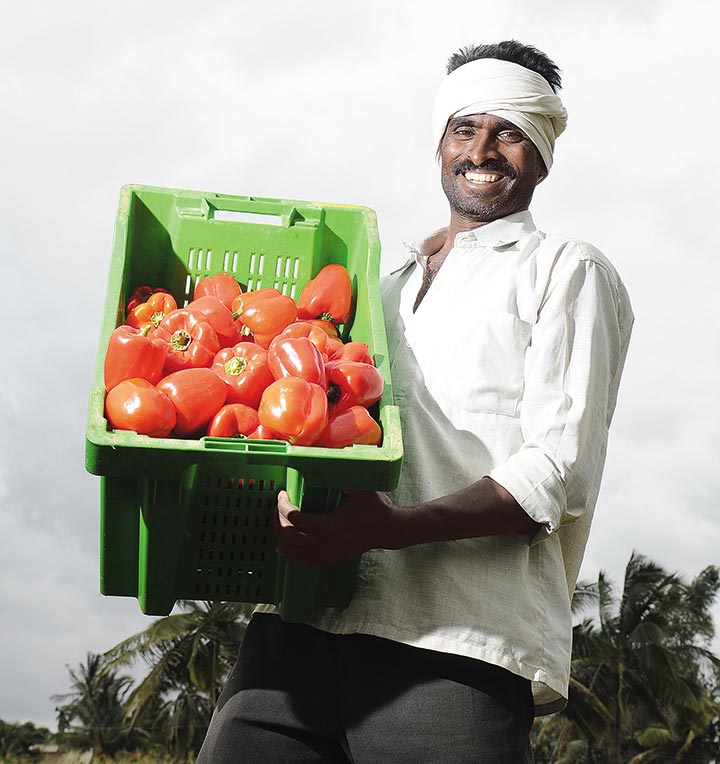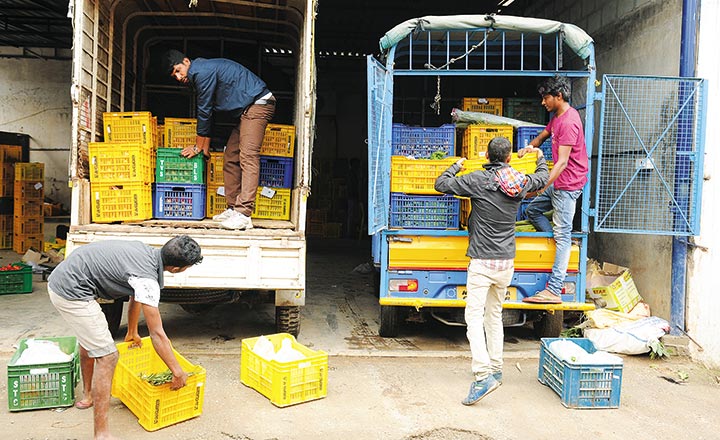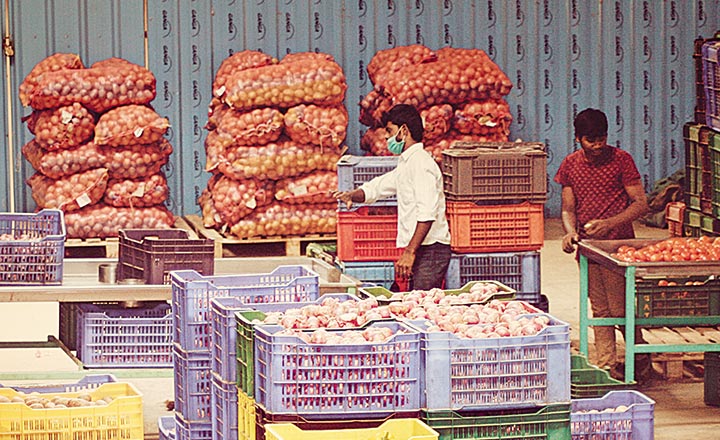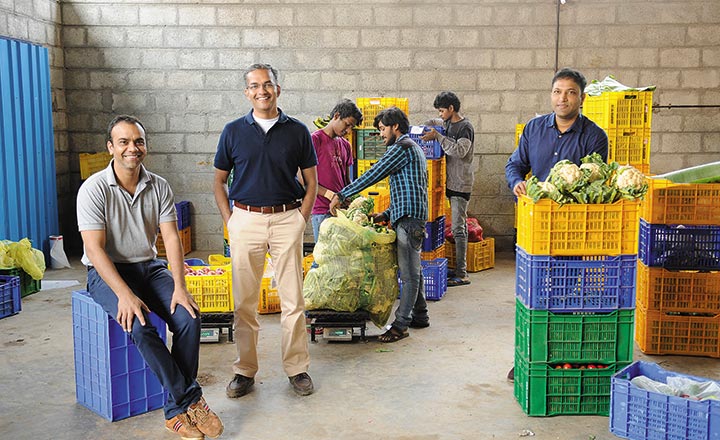It is far better to sell to companies like LivLush than at the mandi (farmer market). Not only are the margins better, but payments are prompt, too,” says Kiran Kumar as he walks through his farm where he grows a variety of vegetables. One can see a swathe covered with a crop of leafy lettuce, with lemongrass plants dotting the boundaries. Kumar’s farms are located in Kattanallur village, not very far from Bengaluru city. He has been regularly selling vegetables to LivLush (formerly Green AgTech), a Bengaluru-based startup, which is working towards professionalising the post-harvest supply chain.
Co-founder Rohan Patnaik feels the current supply chain that starts with the farm up until the end-consumer is extremely unstructured with the farmer’s own interests being compromised. Patnaik explains with the help of an example. “Let us assume that a farmer sells one kind of vegetable for Rs.20 for a kg to the mandi. The middleman would sell it at Rs.70 to the retailer, who then sells it to the end-consumer at Rs.100. The middlemen’s margin comes up to Rs.50 in this case. On the other hand, we would buy the same at Rs.30 from the farmer, which means he makes 50% more, and we sell at a cheaper price to the end-customer,” he says.
The intermediary cornering margins in the farm-to-fork supply chain has been a well-known phenomenon. The need to address this pain point was felt by Patnaik and his two cofounders B Raghunandan and Amol Patil in early 2016.
Accidental startup
LivLush wasn’t their first joint enterprise. The trio first started off by founding RedCooker in Bengaluru in December 2014. “The idea was to connect people with home chefs via an e-commerce platform. We also had three kitchens from where we delivered chef-made food,” explains Raghunandan on RedCooker. Soon, they spotted a great pain point. “We found that we couldn’t trust our vegetable vendor — either on the delivery time or the prices, which he changed everyday. Then we started going to the mandi. The idea was to figure out a trusted source with better commitment on prices,” says Raghunandan. This is where they observed the supply chain in action, and the entire nexus of middlemen. “We realised that the farmer was completely compromised. He only received 15-20% of what the customer pays,” continues Raghunandan.

Struck by this economically skewed nature of the supply chain, the team decided to do something about it — by way of an enterprise. They knew a HNI in Bengaluru, TS Sateesh, who agreed to give them a seed funding of Rs.70 lakh. Coming from Magadi, a village near Bengaluru, Sateesh connected them with 100 farmers to understand the farmers’ side of it. “He said that if someone invested in the supply chain, the farmers’ life will improve,” recalls Patnaik. So the trio started LivLush in March 2016. They would raise the first round later in November 2016 from Elevar Equity Fund. The fund invested Rs.9.6 crore in the social enterprise.
Vipul Rawal, director, Elevar Equity says, “We were looking for a business model that directly addressed the supply-chain related problems of farmers, especially small farmers, and we found a fit in LivLush.” He brings out a crucial point that provides further insight into farmers’ problems in India. “Farmers are never traders. If a farmer takes his produce to a mandi and fails to sell it, he cannot bring it back to home. He ends up dumping it. LivLush arrives on the farmer’s doorstep to buy their produce. Their dealings with farmer are very transparent,” he says.
Progress so far
LivLush offers 200 SKUs that include fruits and vegetables such as tomatoes, onions, potatoes, cauliflowers, cabbages, carrots, lettuces and broccolis. Sixty percent of the sourcing is done directly from farms. “Because we have a long tail with more than 200 SKUs, we also depend on the mandi channel for our products,” says Patnaik.
The team works with seven to eight farmer producer organisations, each of which have 1,500-2,000 members. LivLush seeks to resolve two issues, one on the customer’s side, and the other on the farmer’s. “At the customer’s end, there are unprofessional vegetable vendors who sometimes don’t issue invoices and don’t commit to prices or supply for the long-term. At the farmer’s end, we are putting an efficient supply chain in place and engaging in backward integration with the farmers. The idea is to make the supply chain profitable and also pass on considerably more to farmers,” says Patil.

LivLush makes use of technology in the supply chain to make the payment process transparent. “A farmer is paid the very next day. Almost 90% of farmer payments and 99% of customer payments are cashless,” says Patil.
LivLush’s customers include the Taj Hotels group in Bengaluru, the Marriott group in Bengaluru, Freshmenu, Taj properties in Calicut and Bekal, Social chain of restaurants and the Smoke House Deli chain of restaurants. The Taj group has seven properties around Bengaluru and they follow a tendering process for its kitchen supplies. “We got a competitive bid from LivLush, but since they are new players, we wanted to be sure. We did surprise checks at their facilities and then negotiated with them on our requirements. We ran a trial before finalising them and they have turned out to be a good supplier,” says Abdullah Khan, head of materials for South India at Taj.
Of the 200 SKUs, the top 35 SKUs account for 80% of their business. Within the 35 SKUs, three vegetables — onions (sourced from Maharashtra), tomatoes and potatoes (sourced from Uttar Pradesh and Madhya Pradesh) account for 40% of their business. About 30% comes from cauliflowers, cabbages, carrots, lemons, capsicums and chillies. “We bring onions to Karnataka at a rate cheaper than buying from the Bengaluru mandi, where it sells for Rs.13 per kg. We manage to procure at Rs.7.5 per kg, with an additional Rs.3.5 per kg for transportation, which still comes up to Rs.11. The same goes for potatoes,” reveals Patnaik.
Initial hiccups
Although their seed investor had introduced founders to more than 100 farmers, starting out was not easy. Patnaik recalls how building trust with the farmers took some time. “From a working capital perspective, it was critical to build trust with farmers so that they could give us credit for at least four to five days,” he says.
Building a supply chain is a pretty capital-intensive affair, too. A 10,000 sq ft main warehouse costs them Rs.1.2 lakh per month as rental, with an additional Rs.12 lakh in deposit. Two delivery centres (2,000 sq ft each) are rented at Rs.40,000 per month. A 1,000 sq ft cold storage cost them Rs.10-12 lakh, and 5,000 crates (costing Rs.250 each) was an investment of another Rs.10-15 lakh. All of this is set up in Bengaluru. Their current capacity is enough to handle 70 tonnage of deliveries per day.

“Last year was a really bad time for fund raising. We started in February but could only raise the first round in November. At the time, when we needed to get customers quickly and reach a certain scale to raise funds, we had eight people doing multiple roles. Today we have 42 people working for us, excluding the warehousing staff,” says Raghunandan.
Looking beyond
The company sells 15 to 18 tonne of vegetables and fruits a day, which translates into a turnover of around Rs.5 lakh a day or Rs.1.5 crore per month. To ramp up revenue, the next stop for LivLush is going to be Pune where they expect to sell 8-10 tonne of fruits and vegetables everyday. Apart from Pune, the company is looking to expand to New Delhi, Mumbai, Chennai, Ahmedabad and Hyderabad.
Rawal, who sounds satisfied with how the company is scaling up, says they normally back a company for five to six years. “We are not a seed fund, so we will participate in future rounds, too,” he says.
In the future, LivLush plans to educate farmers about better farming techniques. Rawal thinks this a logical step, albeit a challenging one. “They have to do it for a large number of SKUs. But this is critical for them. If tomato is selling for Rs.85 per kg today, most farmers will sow tomatoes now, but end up dumping them on the road later on. They need to be educated on what’s the right time to sow, how to choose the right crops and the best practices as well.”
Other than that, the company is also looking to enter the retail market by leveraging on modified environment packaging, a technology that keeps vegetables and fruits fresher for longer periods of time. While LivLush will initially invest in a basic machine with an output of 2.5 tonne a day costing Rs.4.5 lakh, the eventual plan is to invest in a bigger machine with capacity of about 20 tonne a day costing around Rs.22 lakh. Patil believes, “We can disrupt the organised retail market when we start retailing vegetables in the future with such packaging.” The company is in talks with leading retailers such as Foodhall, Godrej Nature’s Basket, More and Big Bazaar. There are also plans underway to convert the waste into organic manure and sell that, too.
While currently the enterprise is not profitable, Patnaik is sanguine about starting to make profits by October-November this year. By FY18, the company is expecting to become a Rs.35 crore business.
However, they do face competition in this space. NinjaCart and Farm Taaza are two known players, operating out of Bengaluru itself. But that’s the least of their worries. “This is definitely not a winner-takes-all market. The more, the better,” smiles Patnaik. “But we are the only ones offering a full basket, that is, 200 SKUs. We are going to revolutionise organised retail.”











